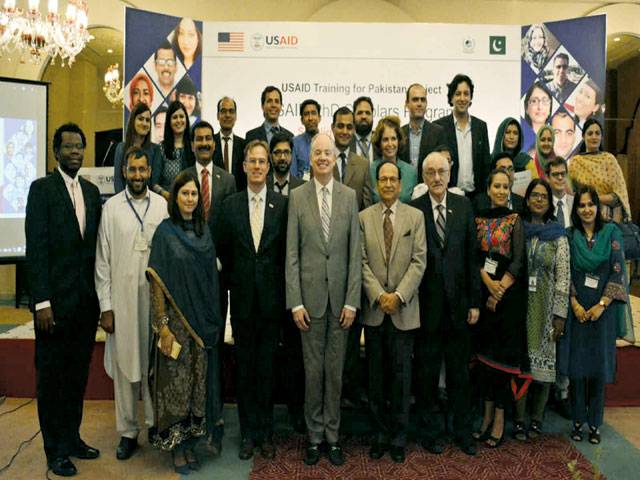slamabadI-Twenty-four PhD scholars who received their degrees in the United States with US government’s assistance shared their experiences here at an event yesterday.
Upon graduation, the scholars returned to Pakistan to serve as faculty members at Pakistani universities. In total, the US government through the US Agency for International Development funded 35 scholars to receive their PhD degrees in education, a US embassy statement said.
Two scholars reflected on their experiences during the event. In their remarks, the scholars discussed the gap between traditional Pakistani teaching practices and internationally standardized teaching methodologies promoted in their PhD programs.
Both scholars expressed their commitment to using their training to improve the quality of education instruction and curriculum development in Pakistan. They discussed the value of the “multiplier effect model” where academic leaders unleashed the genius of their students and colleagues.
The event was attended by USAID Pakistan Mission Director John Groarke and representatives from Higher Education Commission. Groarke encouraged the graduates to think about their futures as educators.
“You have experienced firsthand some of the best teaching and educational resources the world has to offer,” he said. “I encourage you to use your experiences as a launching pad to create meaningful change that will serve future generations.”
The PhD scholarship program is one of several USAID initiatives that strengthen the quality of education and research in Pakistan. Through the Training for Pakistan project, the USAID has committed $33.9 million to provide training to Pakistani professionals across sectors, including education. The program also serves other sectors, including economic growth, agriculture, health, energy, and governance.
Meanwhile yesterday, the USAID and the Food and Agriculture Organization of the United Nations hosted a joint event to commemorate the successful completion of a $32 million, USAID-funded Balochistan Agriculture Project that was implemented by the FAO.
The project encompassed agricultural development activities in eight districts of Balochistan and the Federally Administered Tribal Areas of Pakistan.
Speaking at the closeout ceremony in Islamabad, the USAID Pakistan Mission Director John Groarke said, “USAID is very proud of the successful partnership we had in Balochistan with the government, with the local people and with FAO. We are pleased with the tremendous progress the project made in improving livelihoods of the people in the project areas.”
Through this project, the USAID established 826 community organizations, improving incomes for 16,000 households. The project helped communities and individual farmers increase the production, sale, and revenues from crops and livestock.
The farmers learned about new approaches for farming, better breeds of livestock, better seeds, and more efficient water management techniques. The project helped establish and train community organizations, farmers’ marketing collectives and mutual marketing organizations in grading, packaging, and helped them find better paying markets.
The project also increased the participation of women in income-earning activities, supported improvement in provincial agricultural policies and the legal and regulatory framework for market-led and community-driven investments.
ISLAMABAD: USAID Mission Director John Groarke and Consultant to HEC Chairmen Prof Mahmoodul Hasan Butt in a group photo with the PhD scholars who received their degrees in the United States.–Staff photo by Syed Mehdi






